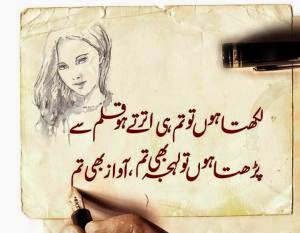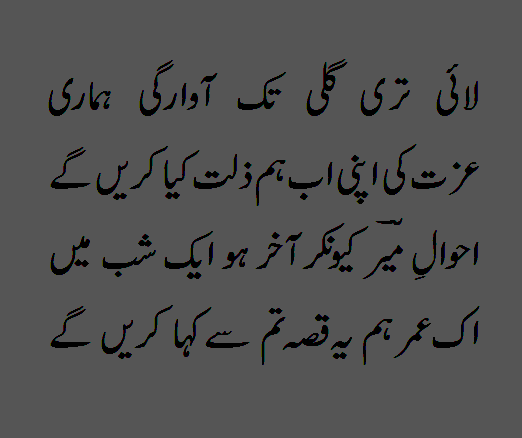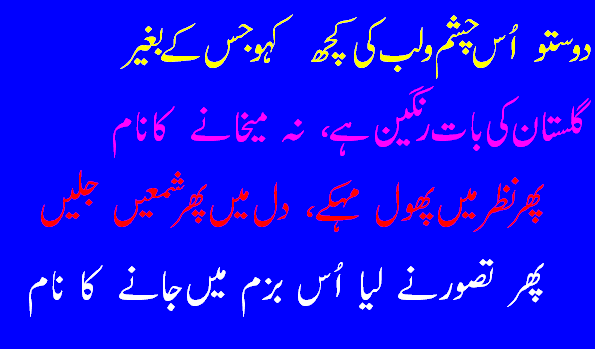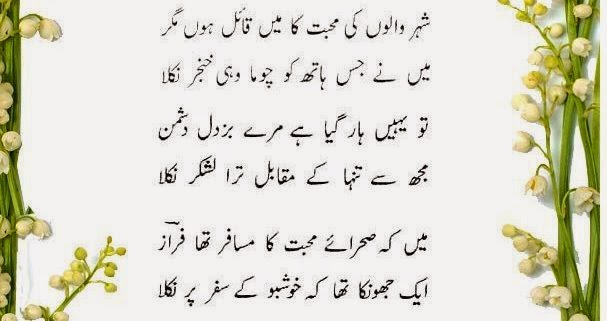Universal Urdu Poetry & Philosophy Urdu shayari
Source(google.com.pk)Urdu poetry is known to the world of literature for its variety of theme, vitality of rhetoric and mellifluousness of lyrics. This genre of poetry in the soil of Pakistan has its tone and its pulse embedded in the cultural and political traditions of the country. Its poetics is identified by a cogent attachment to the history of that land also. Urdu poetry achieved fame in the 18th century when the state language Persian was replaced by Urdu as the official language. It has been highly influenced by the modernist movement that has swayed the worshippers of poetry across the world. The greatest Urdu poet was supposed to be Nazir who lived for 80 years. I those days there were scarcity of medium for communication among the common folks. As a result “shayari” came into existence as a means of expression for love, pain, joy and other universal human emotions. Urdu poetry has its patrons all over the world and it owes its universal recognition to some of the brightest supernovas of this genre.
1:Mirza Ghalib مرزا غالب

2:Allama Iqbal علامہ اقبال

“Beware of the foresight of the believer for he sees with the Divine Light”.
3:Meer Taqui Meerمِیر تقیمِیر

4:Faiz Ahmed Faizفیض احمد فیض

Faiz Ahmed Faiz was born on 3rd February in the year 1911 in Sialkot of undivided India, now in Pakistan. He was born to affluent parents Sultan Fatima and Sultan Muhammad Khan. His father was a successful lawyer who died shortly after the birth of Faiz. Sultan Muhammad had an acquaintance with the nationalist poet of Pakistan Allama Iqbal because he was a member of the elite intellectual circle of his country. Faiz was graduated in Arabic and completed his masters in English from the government college at Lahore in 1932. He also completed masters in Arabic from the Oriental College at Lahore. After completion of his academic discipline, Faiz started his teaching career first in the Amritsar College and then at Hailey College at Lahore. Faiz was an avowed Marxist intellectual who was also a member of the Communist Party of Pakistan and the Progressive Writers’ Movement. He received the Lenin Peace Prize in 1962 from the Soviet Union. Although he was a known atheist, his poems are brewed with elements of Sufi tradition of the South Asia. His poems are a superb blend of traditional rhetoric and romantic realism. Contemporary socio-political issues have also been a major theme in most of his poems. Some of the masterpieces created by the poetic marvel of Urdu language are- Daste Saba, Zindan Nama, Sare Wadiye Seena, Shame Sher Yaran, Nuksha Hai Wafa et al. Faiz Ahmed Faiz was nominated for the Nobel Prize before his death in 1984 at Lahore. He is one of the best selling Urdu poets both in India and Pakistan.
5:Ahmed Faraz احمد فراز

Ahmed Faraz is regarded as the most promising modern Urdu poet of 20th century in Pakistan. His real name is Syed Ahmed Shah and Faraz is his pen name in which he has composed some of the most beautiful verses. He was born on 12th January, in 1931 at Kohat in Pakistan. Often this great legendary versifier is compared with another great seer of modern Urdu Poetry Faiz Ahmed Faiz for his poetic diction and approach. Ahmed Faraz studied in the Edward College and then completed his post graduation in Persian and Urdu- the two classical languages from the University of Peshawar. Later he worked as a lecturer at the same university. He was the descendant of the family of “Haji Bahadur” who was a renowned prophet at Kohat. The two stalwarts in Urdu poetry namely Faiz Ahmed Faiz and Ali Sardar Jafri influenced him greatly in composing his verses. During the Zia-ul-Haque era he went on self imposed exile being accused of reciting poems on Mushaira on protest of the military rule. He lived for 6 years in countries like England, Canada and Europe. When he returned to Pakistan he was awarded the Chairman Academy of Letters and then the chairperson of the National Book Foundation at Islamabad. He was awarded the Hilal-e-imtiaz prize in 2004 by the Pakistani government but he returned the prize as a sign of protest against the policies of the government. On 25th August 2008, the journey of this poet came to an end after enduring prolonged ailment.
These poets by their phenomenal poetic exuberance have enriched the world of Urdu poetry in Pakistan and have won the accolade of lovers of shayari from all corners of the world. Urdu poetry is identified with their sweetness of lyrics and expression of love and despair. Poets like Ghalib, Faiz Ahmed, Allama Iqbal and others will remain immortal in the hearts of unnumbered patrons of Urdu shayari till eternity for their contribution in this genre of poems.
Universal Urdu Poetry & Philosophy Urdu shayari
 |
| Mirza Ghalib مرزا غالب |
 |
| Mirza Ghalib مرزا غالب |
 |
| Allama Iqbal علامہ اقبال |
 |
| Allama Iqbal علامہ اقبال |
 |
| Meer Taqui Meerمِیر تقیمِیر |
 |
| Meer Taqui Meerمِیر تقیمِیر |
 |
| Faiz Ahmed Faizفیض احمد فیض |
 |
| Faiz Ahmed Faizفیض احمد فیض |
 |
| Ahmed Faraz احمد فراز |
 |
| Ahmed Faraz احمد فراز |
No comments:
Post a Comment